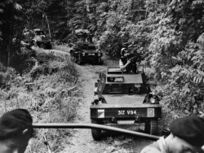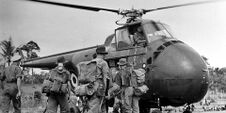Melayu Emergency: Difference between revisions
Jump to navigation
Jump to search
(Created page with "{{Infobox military conflict | conflict = Melayu Emergency<br>Darurat Melayu<br>末羅瑜緊急狀態<br>மெலாயு அவசரநிலை | width = | parto...") |
No edit summary |
||
| Line 15: | Line 15: | ||
* Polynesian troopers conducting a patrol near [[Dungoon]] with [[Royal Melayu Armoured Corps]] | * Polynesian troopers conducting a patrol near [[Dungoon]] with [[Royal Melayu Armoured Corps]] | ||
* Police officers question a local during the Melayu Emergency. | * Police officers question a local during the Melayu Emergency. | ||
* Niagaran soldiers boarding a RNAF Whirlwind | * Niagaran soldiers boarding a RNAF Whirlwind near [[Persimpangan]] | ||
* A wounded insurgent being held and questioned after his capture in 1952 | * A wounded insurgent being held and questioned after his capture in 1952 | ||
}} | }} | ||
| Line 63: | Line 63: | ||
| campaignbox = | | campaignbox = | ||
}} | }} | ||
The | The '''Melayu Emergency''', also known as the '''Anti–Niagaran National Liberation War''' (1948–1960), was a {{wpl|guerrilla warfare|guerrilla war}} fought in [[Federation of Melayu|Niagaran Melayu]] between communist pro-independence fighters of the [[Melayu People's Liberation Army]] (MPLA) and the military forces of the [[Federation of Melayu|Dominion of Melayu]], [[Greater Niagara|Niagaran Empire]] and the [[Royal Commonwealth of Nations|Commonwealth]]. The communists fought to win independence for Melayu from the Niagaran Empire and to establish a socialist economy, while the Dominion of Melayu and Commonwealth forces fought to combat communism and protect Niagaran economic and colonial interests. Many writers believe that the term "Emergency" was chosen to minimize negative political consequences of a colonial war. | ||
==Background== | ==Background== | ||
Revision as of 05:11, 10 February 2023
| Melayu Emergency Darurat Melayu 末羅瑜緊急狀態 மெலாயு அவசரநிலை | |||||||
|---|---|---|---|---|---|---|---|
| Part of the Decolonisation of Frigo and Cold War in Frigo | |||||||
| |||||||
| |||||||
| Belligerents | |||||||
|
Commonwealth forces: Supported By: |
Communist forces: Melayu Communist Party Supported By: | ||||||
| Commanders and leaders | |||||||
| TBDCOMMANDERLIST | TBDCOMMANDERLIST | ||||||
| Strength | |||||||
| Over 552,000 troops | Over 10,500 troops | ||||||
| Casualties and losses | |||||||
|
1,409 killed 2,872 wounded |
7,162 killed 820 wounded 2,530 surrendered | ||||||
|
Civilians killed: 3,103 Civilians missing: 676 Civilian casualties: 6,500+ Total killed: 15,803 TBD | |||||||
The Melayu Emergency, also known as the Anti–Niagaran National Liberation War (1948–1960), was a guerrilla war fought in Niagaran Melayu between communist pro-independence fighters of the Melayu People's Liberation Army (MPLA) and the military forces of the Dominion of Melayu, Niagaran Empire and the Commonwealth. The communists fought to win independence for Melayu from the Niagaran Empire and to establish a socialist economy, while the Dominion of Melayu and Commonwealth forces fought to combat communism and protect Niagaran economic and colonial interests. Many writers believe that the term "Emergency" was chosen to minimize negative political consequences of a colonial war.





